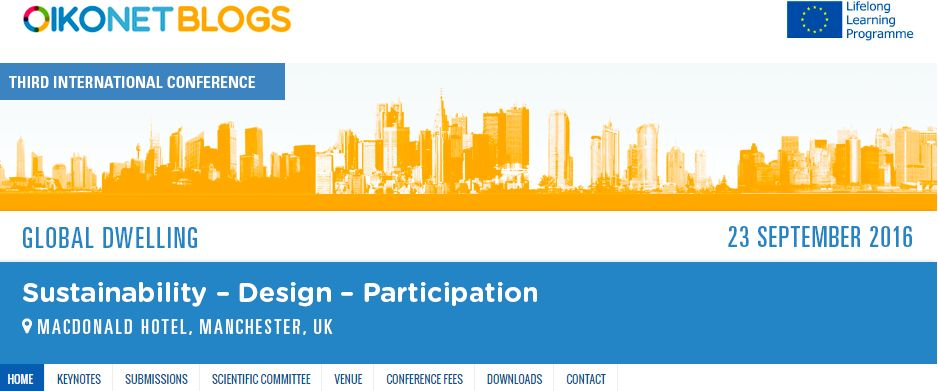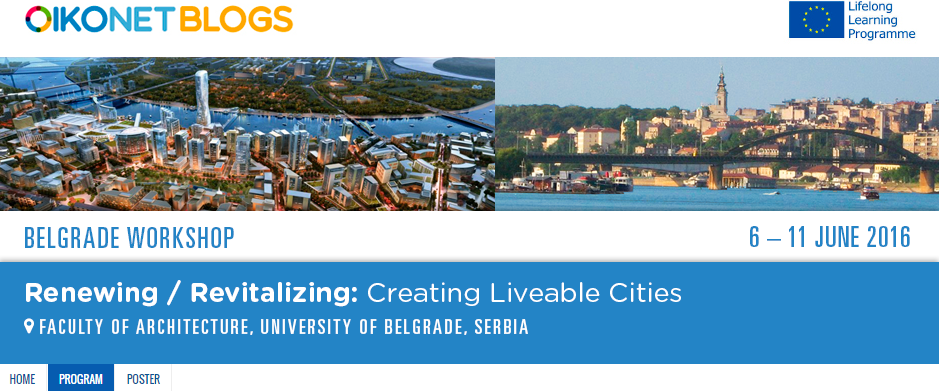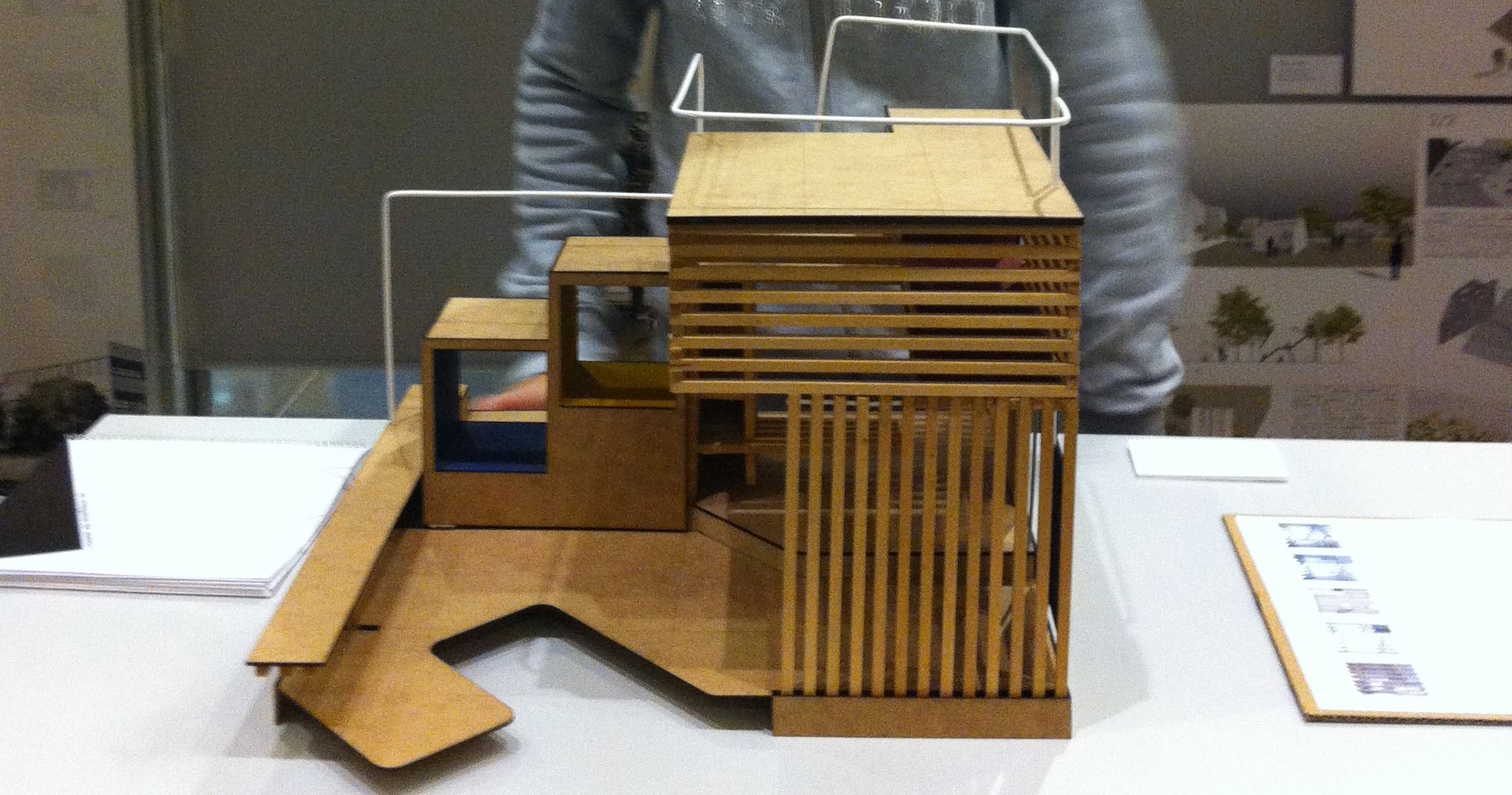|
|
|
|
 Third OIKONET International Conference: “Global Dwelling: Sustainability-Design-Participation”
Third OIKONET International Conference: “Global Dwelling: Sustainability-Design-Participation”
|
The OIKONET conferences on “Global Dwelling” started in 2014 with the first conference at the School of Architecture La Salle, Barcelona, Spain. A year later, a second conference was held at the Faculty of Architecture, Slovak University of Technology.
The third conference will take place at the Renaissance Hotel, Manchester, UK, on 23 September 2016. A call for papers and posters was issued in December 2015. 44 abstracts have been accepted. Keynote speakers include Iván Tosics, one of the principals of Metropolitan Research Institute (MRI), in Budapest.
Registration is now open. If you need further information, please contact us or visit the conference blog

|
 Third OIKONET International Workshop: “Renewing / Revitalizing: Creating liveable cities”
Third OIKONET International Workshop: “Renewing / Revitalizing: Creating liveable cities”
|
The third OIKONET international workshop “Renewing/Revitalizing: Creating liveable cities” will take place at the Faculty of Architecture, University of Belgrade, from 6th to 11th of June 2016. This workshop will be dedicated to examining strategies that embrace the multiple dimensions, scales and actors involved in the process of creating liveable cities. These strategies will integrate architectural, urban design and urban planning issues to create a multifaceted framework to develop liveable cities.
The workshop will provide a learning environment in which students and faculty members from schools of architecture from different countries in Europe will discuss a variety of approaches to create liveable cities. The learning activities will include lectures, field studies, and practical work in the design studio carried out during the five-day workshop. Before the workshop, during April and May, there are preparatory activities carried out distantly by the participating students assisted by tutors at their institution as well as from other partner schools of the OIKONET network, using OIKODOMOS Workspaces.
You can find more information on the workshop blog or in the Facebook group. If you would like to join the workshop, please contact us.

|
 MOOC “Housing Design: from Concept to Fabrication”
MOOC “Housing Design: from Concept to Fabrication”
|
The MOOC (Massive Online Open Course) "Housing Design: from Concept to Fabrication" introduces the design of housing for both expert and novice learners. Through a series of modules, various subjects are combined to produce the design of a housing prototype: participatory processes, sustainability, energy efficiency, parametric design plus a self-study module on digital fabrication. Each module encompasses a number of tasks that lead to explore key ideas in housing design. Students who successfully complete the first three modules will be able to bring their results together to produce a design and / or parametric design for the fourth module. An individual’s parametric design can also provide the basis for submission to the course competition. Entries should address the fabrication of their design. For this purpose, a self-study module on “digital fabrication” is included to provide background information on this topic.
A first edition of this MOOC was delivered at the beginning of the academic year. The contents and structure have been reviewed for the second edition that was launched in May 2016. If you would like to enrol, please visit the Canvas website.

|
 Conference Papers, Articles
Conference Papers, Articles
|
The paper "Enhancing a Housing Technical Design Studio with a Collaborative On-line Learning Space", by Jim Roche and Leandro Madrazo, was presented at the AACE Global Learn Conference which took place in Limerick, Ireland, April 28-29, 2016.
The article of Josip Panžić “Global Dwelling: Housing Regeneration Strategies” was published in the Croatian Journal of Social Policy, vol. 22, pp.415419.
Viera Joklova and Henrich Pifko published the article “Innovation in architectural education - OIKONET experience” in the Global Journal of Engineering Education (GJEE), Vol.17, No. 3.
Sašo Medved and Boris Vidrih prepared the paper “Evaluating the potential of local urban heat island mitigation by the whitening and greening of the settlement surfaces”.
In June 2016, the paper “Applying a Blended Learning Methodology to the Study of Housing” from Leandro Madrazo, Carla Sentieri and Nadia Charalambous will be presented at the EAAE ARCC International Conference in Lisbon.
|
 OIKONET Reader #2
OIKONET Reader #2
|
The second issue of the OIKONET Reader presents a selection of themes on housing proposed by partners involved in the “Housing Research” subnetwork. As the first issue, it illustrates research topics related to contemporary housing policy and practice, which can serve as a guide for the work carried out in the “Pedagogical Activities” and “Community Participation” subnetworks.
The Reader is structured into ten chapters. Chapter 1 discusses urban brownfields regeneration in the UK by reviewing programmes that support and encourage the development of brownfield sites. Chapter 2 examines the phenomenon of urban heat island and how this can be mitigated by the whitening and greening of urban settlement’s outdoor surfaces. Chapter 3 reviews post-conflict regeneration programmes in the historic centre of Nicosia in Cyprus. Chapter 4 discusses neighbourhood regeneration in Oslo, Norway, by critiquing the programme’s approach for Inner City East and Groruddalen. Chapter 5 examines regeneration of multi-family buildings in an old mining community in Zagorje ob Savi, Slovenia. Chapter 6 discusses the challenge of privatised housing management across CEE and CIS countries through work conducted by the Housing and Urban Development Studies (IHS), the challenges facing Riga in Latvia are also reviewed. Chapter 7 examines local community responses to urban planning proposals for housing regeneration. Chapter 8 discusses development policies directed at community participation and empowerment, community driven development approaches are used to explain the synergies. Chapter 9 reviews urban planning and the role of participation in housing using the case of Budapest, Hungary. Chapter 10 discusses the concept of housing innovation as an instrument of integrated sustainable urban development; it also examines the requirements for a housing innovation in order to be considered sustainable and affordable.
You can access Reader #2 and participate in the discussions in the comments section.
|
 Learning Spaces
Learning Spaces
|
In the spring semester 2015/16, four partners are participating in the “Thinking Dwelling” program carrying out activities that are linked to courses at their schools: School of Architecture of Valencia (Spain); Istanbul Technical University (Turkey); Université Grenoble Alpes (France), and University of Puerto Rico. The purpose of the program is engage students and teachers from different courses, levels and schools, in a joint process of reflection about contemporary dwelling. The School of Architecture La Salle, Barcelona has produced a publication of the work done in this program at the beginning of this academic year.
Also other open learning spaces (“Introduction to Housing”, “Urban Systems”, "Habitat Regeneration Strategies", “Urban Housing Regeneration") have been active this semester, involving about a dozen of partners in shared learning activities. You can get more information about OIKONET learning spaces in this report.
|
|
|
|
|
|
|
|